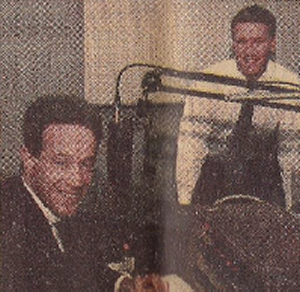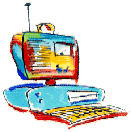
First real-time interactive music show delivered live from a studio in Canada
Vancouver Sun
 On September 29, 1996 Hugh Dobbie and Tom Lucas streamed Oldies Online from the dowco.com Internet studios in Coquitlam, a suburb of Vancouver, BC. Peter Wilson covered the achievement ion a full page article on the front page of the Vancouver Sun’s Technology section.
On September 29, 1996 Hugh Dobbie and Tom Lucas streamed Oldies Online from the dowco.com Internet studios in Coquitlam, a suburb of Vancouver, BC. Peter Wilson covered the achievement ion a full page article on the front page of the Vancouver Sun’s Technology section.
The caller from Tucson, Ariz. wants to hear Little Deuce Coupe. And he has a question for disc jockey Tom Lucas. Where exactly is the studio of Oldies Online anyway?
“We’re in Vancouver,” says Lucas. “In British Columbia. Do you know where that is?”
The caller says, yes, he does indeed know of Vancouver, but he seems unsure. You can almost see him make a beeline for the atlas after he hangs up.
Seconds later, the sounds of Little Deuce Coupe bubble up from behind Lucas’ voice and the harmonies of the Beach Boys make their way out across the Web to computer speakers as far away as Singapore.
On the Internet, as the punchline of the New Yorker cartoon goes, people don’t know you’re a dog. But, on this Sunday afternoon in October, Dowco Radio’s head man, Hugh Dobbie, does know exactly where his listeners are.
Someone online in Norway has just been reminiscing to the songs Downtown, Crimson and Clover and Girl, You’ll Be a Woman Soon. In Yugoslavia a user has been immersed in the nostalgia of tunes like Roll Over Beethoven and Taking Care of Business.
Between the various sounds of yesterday, Lucas urges his listeners to phone in their requests to a 1-800 number and to get in touch via e-mail.
During the four hours of the show, audience members, largely North American, log on and off, E-mail arrives, Calls come in. The audience ebbs and flows as the RealAudio-encoded music pounds out relentlessly to the world from the makeshift studio in Coquitlam.
Oldies Online, heard every Sunday from 5 p.m. to 9 p.m., is off to a good start, says Dobbie, president of Dowco Computer Systems. A few months ago, he concedes, he wasn’t so sure this new medium was worth the considerable investment.
The idea for the show came to Lucas – a veteran of CFUN’s glory days and more recently of Roger’s Satellite Radio Network – when he began to foresee the death of traditional radio.
“I wondered if there wasn’t a way I could keep on doing what it is I do. And then I heard about this wonderful toy called the Internet. One thing led to another and, about 300 lunches later, Hugh and I started putting together a plan.”
Until recently, Internet broadcasting has consisted almost entirely of the repackaging of existing live radio signals. Dobbie’s own company, in fact, already carries the output of Vancouver’s CKNW and Classic Rock 101. But Lucas had the idea of creating content on the Internet first and then, perhaps, porting it back to traditional broadcasters.
Internet delivery of radio shows would fit neatly with present broadcast technology and be cheaper than a satellite feed, says Dobbie, who already has a dozen broadcasters in such diverse locations as Saskatoon, the Okanagan and Bathhurst, N.B., interested.
“But when I first talked to Tom about this I thought sound on the Net was still too much in its infancy,” he adds. “By the end of July I had changed my mind.”
And, in a happy example of serendipitous technological convergence not only has RealAudio, just released a powerful, stereo-capable new version of its dominant Internet sound package but B.C. Telephone has also announced it will be offering high-speed Net access to its home customers.
At the moment, however, Dobbie and Lucas are still in startup mode. Radio Dowco has only a 100-stream licence from RealAudio. This means that, unless several of those streams are split, only 100 users (or fewer, depending on conditions) can listen to the show at one time.
In another few weeks, with a move to Harbor Centre which houses the hub of B.C.’s Internet backbone, Dobbie plans to have an ethernet connection and an infrastructure in place that will give the show 3,000-stream capability.
If all goes well, Dobbie sees the potential for the Lucas venture and other Dowco shows (one on boating is planned, for example) to be streamed across the country both to radio stations and to points of presence (POPs) that would split the signal into additional streams for major cities.
“By Dec. 1 we’ll be in Chilliwack and Abbotsford,” says Dobbie. “So we’re growing regionally first. The next logical thing is to develop a POP in Calgary.” That way, he adds, 100 Calgary Internet users at a time can hear the show without depleting Vancouver access.
To increase the number of streams, though, is an expensive venture.
“When we bought this 100-stream licence back in December of 1995 it was just under $20,000 Canadian,” says Dobbie. “That’s scary. That’s why you don’t see too many of these licences around.”
So far, estimates Dobbie, $75,000 to $100,000 has been allocated by Dowco to the radio operation. That’s something that a smaller company couldn’t afford, but Dowco is the offspring of Dowco Consultants, a major Vancouver steel detailing company that was a pioneer in the use of computer graphics.
Over the years the parent company created a computer hardware company with engineering industry clients and then set up its own Internet server to allow it to send plans to its clients around the world.
“With Oldies Online and shows we develop after that we’re becoming content providers, much like a CHUM or a network syndication outlet. We’re developing content that gets sampled on the Internet. If somebody likes it and wants to pick up the show then they can get it on the Internet or over satellite.”
Despite this, Oldies Online will remain Internet-based.
With Lucas’ personal oldies collection as its source, each song used on the show will eventually be encoded in RealAudio so that the whole station operation becomes computer driven.
Dobbie sees this as another avenue for development.
“We visited a lot of radio stations when we were travelling around trying to sell the show. And what struck me, with all due respect, is that the back end of radio, the way they handle music is quite primitive. As we automate we expect to sound really nice.”
